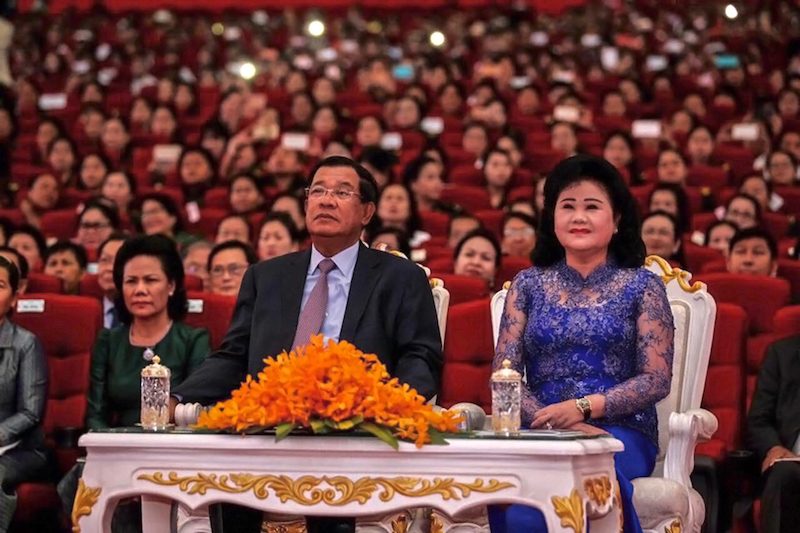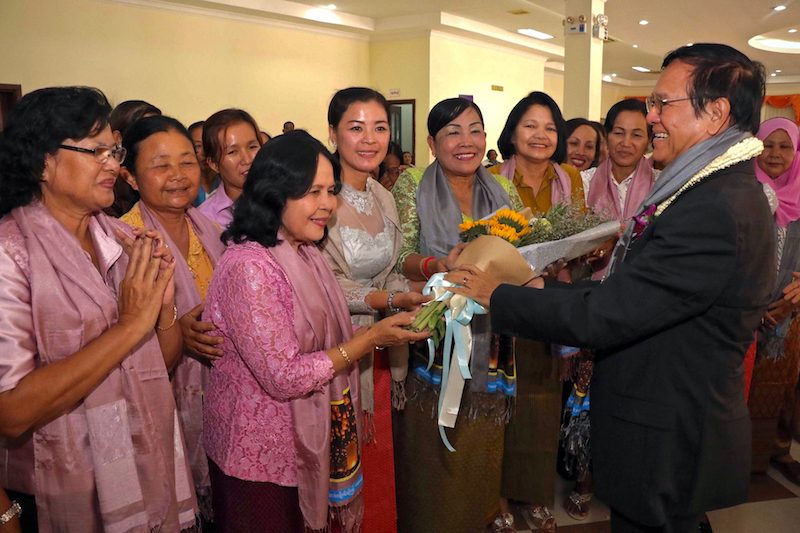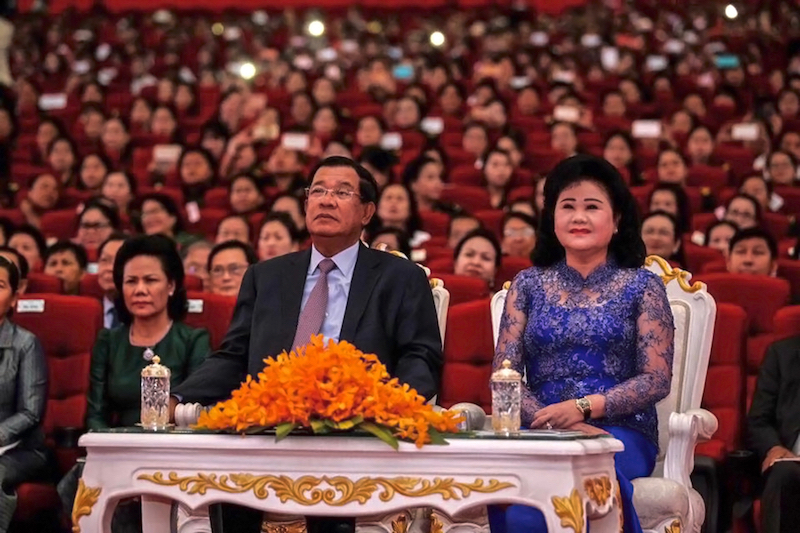For the ruling CPP, the promise was to appoint a woman as governor for one of the country’s 25 provinces. For the opposition CNRP, its boast was having 60 female commune chief candidates—up from fewer than 10—to run in Cambodia’s 1,646 communes for this year’s elections.
Though both parties’ proposals remained a long way from achieving gender parity, they nevertheless used the occasion of International Women’s Day on Wednesday to put forward competing claims of being the more woman-friendly party at celebrations around Phnom Penh.

Speaking at an event on the city’s Koh Pich island, Prime Minister Hun Sen announced that the government was preparing to appoint at least one woman as a provincial governor and increase the number of female leaders in the military.
He reminded the audience that the government already had a quota policy designed to include more women in politics, and women across the country had been appointed as deputy provincial governors and district governors.
“Our only problem here is that all 25 provinces [including] the municipality has no woman governor yet,” he said.
After discussing the issue with Interior Minister Sar Kheng, the pair had agreed to appoint at least one woman as provincial governor when an opening appeared, he said.
“So any province where the governor is going to retire or [there is] any change, we will put a woman as the replacement in at least one province, or two provinces is much better,” Mr. Hun Sen said.
The premier also promised to appoint more women as army commanders and military police commanders.
“We have appointed many women in the position as secretaries and undersecretaries of states, but I want to go deeper,” he said.
“In return, I appeal for women themselves to improve their own capacities,” he added.

Mr. Hun Sen said the last female provincial governor—in the early 1990s—had proven that women were up to the job.
“Her Excellency Lak Aun was the governor of Ratanakkiri province during the period the country was surrounded with war…. Our woman governor at that time could handle such difficulties,” he said, referring to the country during a transitional period between 1989 and 1993.
Within the national cabinet, there is a smattering of high-ranking women: Ing Kantha Phavy, the minister for women’s affairs; Phoeung Sakona, the minister for culture and fine arts; and Men Sam An, a deputy prime minister and the minister of National Assembly-Senate relations and inspection. Ms. Aun, the former governor, is currently a CPP senator.
Across town, at a hall in Meanchey district, opposition officials boasted of their superior progress in empowering women, and screened a short film blaming City Hall for the death of Pen Kunthea, a sex worker who died trying to flee the notoriously violent Daun Penh district security guards in January.
Appearing in a pre-recorded video, former CNRP President Sam Rainsy—who resigned last month but remains a figurehead—said the party had registered 60 women to run as commune chiefs in the June commune elections, up from fewer than 10 in 2012.
He said he expected at least 500 female CNRP candidates to be elected as commune chiefs, deputy chiefs or councilors. There are 11,572 seats up for grabs.
Kem Sokha, who was the party’s deputy but replaced Mr. Rainsy as leader at a congress last week, said the appointment of senior official Mu Sochua to vice president at the same congress was proof that they were the more gender-equal party.
“If we compare with other political parties in the Kingdom of Cambodia, which boasted that they provide power to women, [they] did not provide a top leadership position to a woman like the CNRP did,” he said.
At the event, under the title “Thousands of Lights for Women,” party members also awarded symbolic certificates to “outstanding women,” such as prominent land activist Tep Vanny and senior Adhoc official Lim Mony, who are both currently imprisoned in separate cases widely perceived as politically motivated.
Ros Sopheap, executive director of gender equality group Gender and Development for Cambodia, said the government had, as promised, gradually increased the number of women in politics.
Mr. Hun Sen “said before the commune elections in 2007 that he wanted to see more women, and then it went up from 8 percent to 15 percent,” she said, referring to the percentage of elected commune officials who were women. After the 2012 elections, she said representation climbed again to 18 percent.
But pure statistical representation was not enough, she said, given the lack of policies that reflected women’s needs.
More of a female focus was needed in areas such as health, gender-based violence and sexual assault, education and employment, she said.
She added that more women—“not only one or two”—should be appointed provincial governors.
“We have 25 provinces. I think at least 10 women should be taking positions of provincial governor,” she said.
(Additional reporting by Hannah Hawkins)




